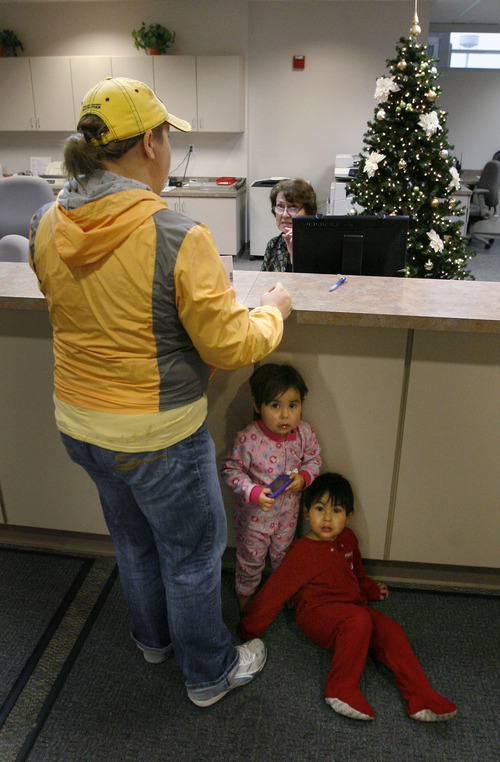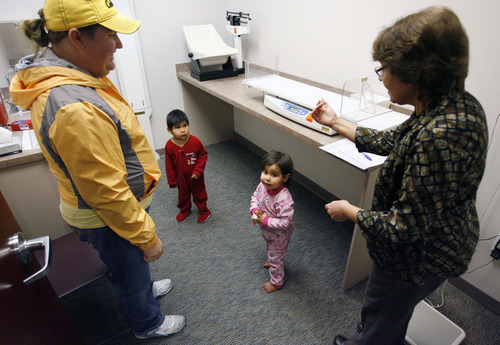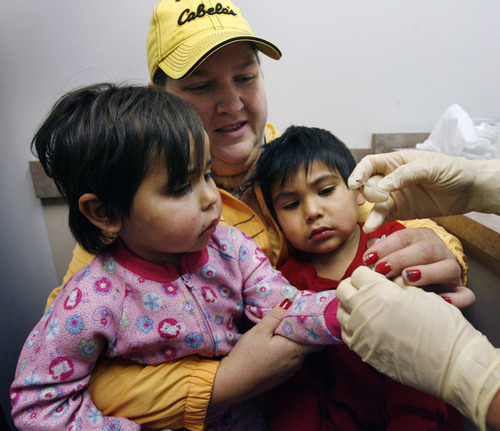This is an archived article that was published on sltrib.com in 2010, and information in the article may be outdated. It is provided only for personal research purposes and may not be reprinted.
Ogden >> Amerie and Trace Delgado submit to having their fingers pricked without a wince or whimper.
"They're tough. They've been through a lot," said their foster mother, Heather, who on this December morning has brought the pajama-clad 2-year-olds to the Weber-Morgan Health Department for the blood draw and a nutritional assessment. She is adopting the Delgado twins knowing little about their medical histories, their heritage or the hurts wrought by poverty, crime and neglect. What matters is not "how they came" to her, but "that they came," she said. "We have room in our home and hearts."
It's a philosophy shared by only a handful of the state's social welfare programs.
Most public aid is off limits to undocumented immigrants. Only some food and emergency medical programs pay no regard to a person's immigration status, such as the federally funded nutrition program, Women, Infants and Children (WIC), which the Delgado twins draw upon.
These health safety nets appear to cater disproportionately to immigrants, according to research by The Salt Lake Tribune. But contrary to popular belief, their claim on this aid doesn't shut out American citizens.
"All eligible citizens qualify, so there's no crowding out of citizens by illegal immigrants," said Jennifer Tolbert, a health policy expert at the Henry J. Kaiser Family Foundation.
Still, those programs and other aid provided to families with undocumented members mean fewer tax dollars for other purposes, notes one Utah lawmaker. Undocumented immigrants can't access the "big three" social supports: welfare, food stamps and Medicaid. But their citizen children can, and their numbers are growing.
—
Urban melting pot •WIC, which doesn't track clients' citizenship status, provides pregnant women and mothers with vouchers for healthy staples, such as bread, milk and baby formula.
The state's $39.2 million program disproportionately caters to Latino women. In fiscal year 2010, nearly 40 percent of WIC's 75,000 enrollees listed themselves as Latino. About 13 percent of Utah's population is Latino.
Years ago, the waiting room of the Weber-Morgan WIC clinic was predominantly filled with young, white moms. Now, it's an urban melting pot of all ethnicities and ages, said its director, Colleen Jenson. "It seems like we're preaching the same messages, but to a new group of women."
The federal government gives Utah a lump sum for WIC each year. Should food prices escalate, the state could ration benefits, reserving them for the least healthy.
But that hasn't happened for more than a decade despite nearly 60 percent enrollment growth over the past three years, Jenson said.
WIC differs from other food assistance in that participants must undergo counseling on healthy eating and breastfeeding, and children are tested for iron deficiency.
The program acts as a medical home for the uninsured, an avenue for spotting family health problems for treatment by private, charitable and federal health clinics that offer reduced-price medical care.
In this way, WIC also helps with disease surveillance. Undocumented immigrants can get free immunizations, counseling to quit smoking and free or discounted drugs for communicable diseases, such as tuberculosis and HIV/AIDS.
"When we provide a vaccination to a child, or to adults who are around children, then we protect everybody's children," said Teresa Garrett, state director of public health practice. "Germs ... don't care where you're from or what socioeconomic class you come from. They're just after a host."
—
Charity care • The cost of these public health programs, however, pales in comparison to Medicaid.
Of the 191,962 Utah households using Medicaid and its affiliated Children's Health Insurance Program so far this fiscal year, 12 percent had an undocumented member. The average annual benefit per beneficiary ranges from $3,516 with CHIP to $9,524 with Medicaid.
Also, in 2010, Emergency Medicaid paid for 4,256 births to low-income Utah women, totaling $15.9 million. Nearly all of those women were probably immigrants, undocumented and those who are in the United States legally but have not yet reached the five-year bar to receive public benefits. Citizens qualify for full Medicaid coverage, and they generally sign up well before delivery for prenatal care.
Emergency Medicaid pays to treat life-threatening medical emergencies of the poor and uninsured, regardless of immigration status. It has drawn more scrutiny than WIC, but federal law prohibits states from paring emergency benefits. It alleviates some of the charity care burden on hospitals, which can't refuse emergency patients based on their inability to pay.
Demand for both programs has grown significantly.
Rep. Chris Herrod, R-Provo, argues that strain on budgets can lead to a reduction in "optional" benefits for citizens, such as Medicaid coverage for dental and vision care.
"There's only so much money to go around," Herrod said. "It has to come from somewhere."
Indeed, the state's share of the 2010 Emergency Medicaid expenditures — $7.8 million — far exceeds the $3.2 million saved last year by cutting dental and vision care.
For the Delgado twins, WIC provides a blood test to probe whether they are anemic. Staff also check their weight and height, alerting Heather that Amerie is a little overweight. It doesn't surprise her, given the kids' food hoarding.
"They were obviously neglected," said Heather, who asked that her last name not be used to protect the children's privacy. Their parents are incarcerated. With all their challenges, Heather said, WIC is a "nice supplement" for the grocery bill of the growing — soon to be eight — family.
Facts on welfare and immigration
For some additional findings, go to http://bit.ly/gnzSDX —
Indirect benefits
Some households with undocumented members indirectly benefit from assistance given to their citizen relatives, usually U.S.-born children. A look at the numbers so far for fiscal year 2011:
Of the 240,662 Utah households relying on welfare, food stamps, Medicaid and its affiliated Children's Health Insurance Program (CHIP), 23,853 households, or 10 percent, included an undocumented member. The average monthly welfare benefit received by those families was $392, and their average monthly allotment of food stamps was $339.
In fiscal year 2010, Utah also spent $38,658 on day care for the citizen children of undocumented immigrants. That's less than 1 percent of the $44.6 million spent on child-care subsidies statewide. —
Immigration fact check
The claim • Undocumented workers claim state and federal assistance that diminishes resources available to legal residents.
The reality • Undocumented immigrants don't qualify for most public aid. They do, however, qualify for some food and emergency medical programs such as the federally funded nutrition program, Women, Infants and Children (WIC). These health safety nets appear to cater disproportionately to them, although their receipt of this aid doesn't shut out legal residents. —
About the series
In coming months, Utah lawmakers intent on immigration reform will argue their case based sometimes on facts and sometimes on assumptions. In a series that continues through Monday, The Tribune examines whether common claims made about undocumented workers match reality.
Coming Saturday • Do illegal immigrants commit more crimes than the rest of the population?
Online • Read previous stories at http://www.sltrib.com.







